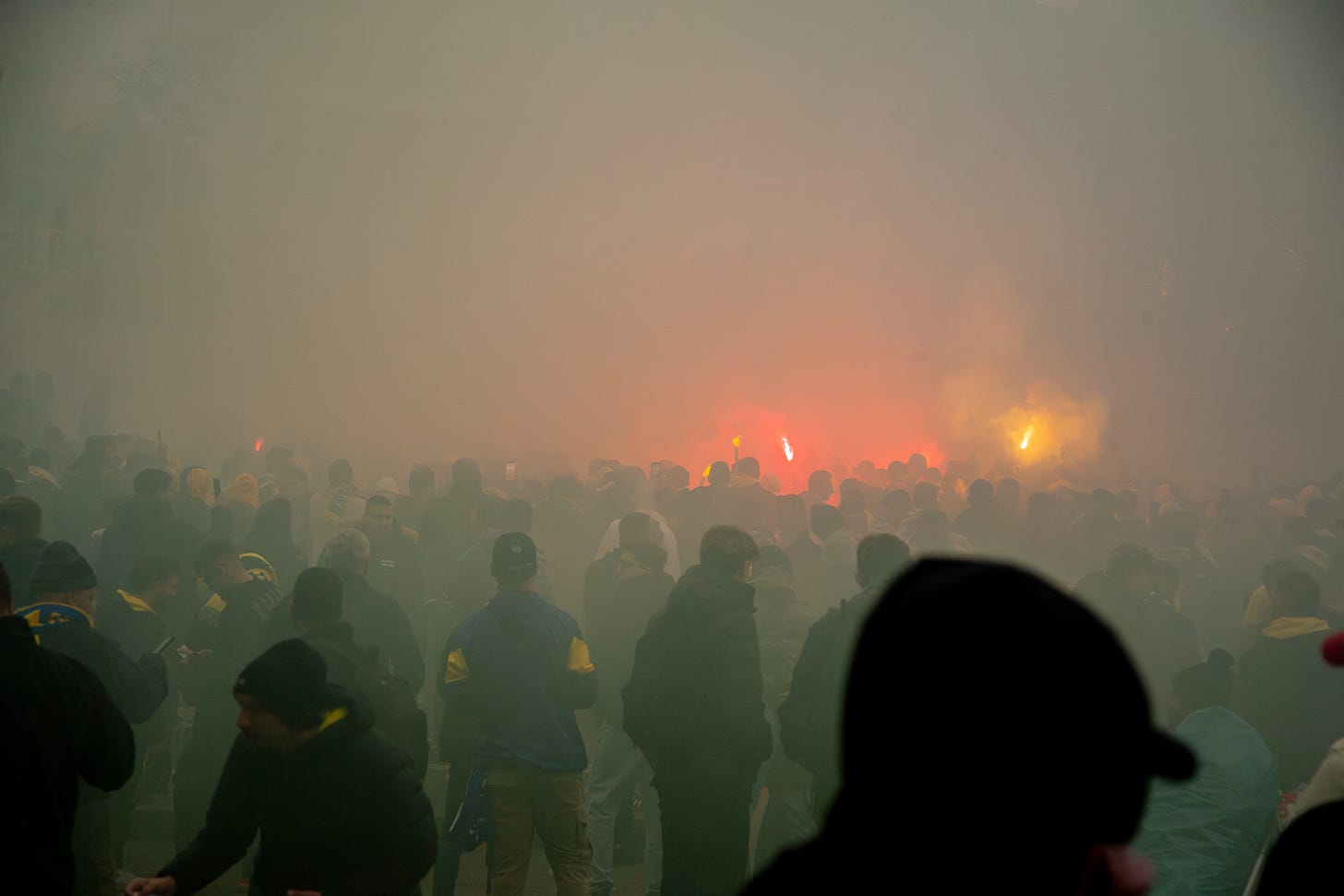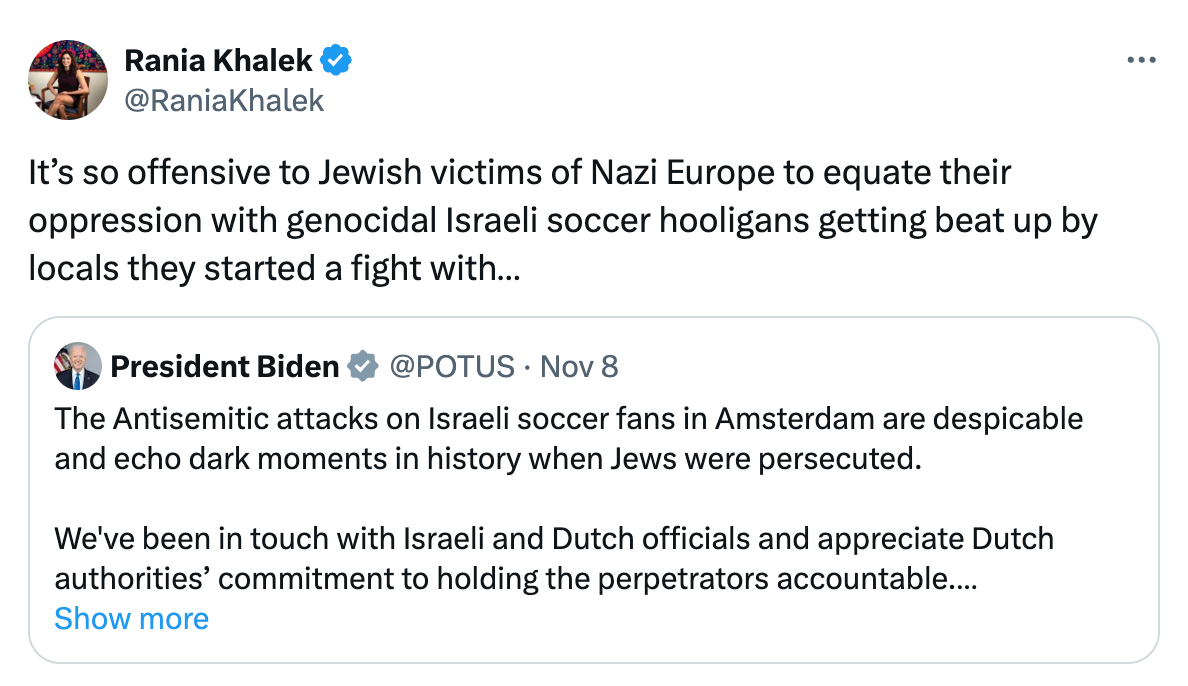“We’re Going On a Jew Hunt”
Last week’s violence in Amsterdam was blatantly anti-Semitic. Excuses are inadmissible.

On Wednesday night last week in Amsterdam, a group of Maccabi Tel Aviv soccer fans set fire to a Palestinian flag, vandalized a taxi driver’s car, and sang revolting chants about dead children in Gaza.
The next day, a “Jew hunt” organized on WhatsApp and Telegram took place that saw gangs scour the city for not only Maccabi Tel Aviv supporters, but anyone they suspected of being a Jew. Many of the beatings were “hit and run” attacks by men on scooters. Taxi drivers coordinated with each other over WhatsApp groups to hunt down Jews. In one widely-circulated video, a driver says, “Today we’re going on a Jew hunt.”
Some of those targeted were chased with knives and bats, some had fireworks thrown at them. Those caught were subject to extreme acts of physical violence. Videos show a man kicked and beaten while already unconscious; a man beaten in the middle of a road; a man swimming in a canal in apparent flight from his attackers, who let him go only after he was forced to shout “Free Palestine.” Police reported five hospitalizations and around 20-30 others treated for minor injuries. “This is so shocking and despicable that I cannot get over it yet. It is a disgrace,” Amsterdam mayor Femke Halsema told The Wall Street Journal.
Several victims spoke to the BBC about what happened. Their stories are shocking.
Adi Reuben, 24, described being surrounded by a group of men, who shouted “Jewish, Jewish, IDF, IDF” at him. “They started to mess with me and I realised I had to run, but it was dark and I didn’t know where to go. I fell to the floor and 10 people were kicking me. They were shouting ‘Palestine,’” Reuben said.
Gal Binyanmin Tshuva, 29, described a group of around 20 men demanding to see his passport and then beating him when he refused. “I don’t remember anything after that, and I woke up in an ambulance with blood all over my face, and realised they had broken two of my teeth,” Tshuva said.
Two British-Jewish men, identified as Aaron and Jacob, came to the aid of an Israeli man being stamped. As they were trying to leave, one of the attackers shouted, “You helped a Jew” and punched Aaron in the face, breaking his glasses.
The story of the violence in Amsterdam spread rapidly around the world setting off a heated debate about who was to blame. With little nuance in today’s polarized political climate, you were either with the Jews or against them. A cursory search for “Maccabi Tel Aviv” on X revealed where many people’s sympathies lay:
Meanwhile, on Mehdi Hasan’s newsletter Zeteo, Marc Owen Jones argued that the media systematically discounted the anti-Arab racism that he says caused the violence. He wrote:
So marginalized were stories attempting to explain violence from Maccabi Tel Aviv fans that one Amsterdam resident took to social media to call out the media bias. She described hiding in fear as Israeli supporters attacked her home for displaying a Palestinian flag, stating in Dutch, “I hardly see anything in the media about my experience—that letting loose agitated football hooligans with war traumas, from a country that commits genocide and engages in extreme dehumanization, in the city *regardless of whether there are counter-protests* is not a good idea.”
Other activist journalists were even more explicit:
While excusing violence towards the Maccabi Tel Aviv supporters because “they started” it, Khalek, a well-known journalist who writes the site “Dispatches From The Underclass,” also made sure to remind her audience that “while the media helped Israel lie to the world about Amsterdam, Israel continued to murder people en masse across the Levant.”
Khalek continued, “Israel murders Arab children around the clock, yet the media spent 2 days sympathizing with and lying for genocidal Israeli sports fans in Amsterdam.”
It is perfectly reasonable to criticize the disgusting behavior of the Maccabi Tel Aviv hooligans whose conduct helped inflame tensions. You could even argue that the Israeli government’s actions in Gaza provide the best explanation as to why mobs descended onto Amsterdam to beat up every Jew they could find. But it does not justify it. Whatever you might think of the behavior of the Maccabi Tel Aviv fans, certainly there is no justification for indiscriminately attacking Jews who have nothing to do with those hooligans on Amsterdam streets or throwing them into canals.
But this is the double standard Jews are held to. Pro-Palestinian activists believe Israel is disproportionately and collectively punishing Gazans for the actions of Hamas. This argument is not without merit, but by extension they must also believe that Jews should not be disproportionately and collectively punished for the actions of the Israeli government. And yet, somehow, in so much internet discourse, there is no longer any distinction between Jews and Israel.
“You would never apply that logic to any other community,” says Iranian activist Elica Le Bon in a video on X. “If Muslims in the West, innocent civilians here were being attacked, nobody—nobody would ever say ‘well, look at what the Islamic regime in Iran is doing, look at what Hamas did on October 7th and they supported that.’”
Le Bon continued: “Because you understand the difference between Muslims here, and a foreign regime or government, but somehow you just can’t make that distinction with Jews. The inability to make that distinction, the perception of Jews as not humans but a government is quite literally the definition of dehumanization. You are no longer human, you’re a government, and when you stop being human, it makes it that much easier to kill you.”
That point is even more clear if we for a moment set aside conflict in the Middle East. If fans of Liverpool or Real Madrid or AC Milan are rowdy during a soccer match—a far-from-inconceivable possibility—nobody would take to the internet justifying widespread violence against all Brits, Spaniards, or Italians. Furthermore, activists routinely call for the death of Jews and burn the Israeli flag during protests, but we do not see similar reactions targeting all Muslims or Arabs—or any other ethnic group.
Le Bon’s is a rare voice of reason in the middle of a polarized discourse. So much of what is being written about the incident focuses on who started it—as if the behavior of football hooligans, or the state of Israel, could excuse all the violence that followed. The core issue here is assigning collective blame to a group based on the actions of a few individuals. Maccabi Tel Aviv fans acted out of order, goes so much of the logic, therefore the Jews had it coming.
We have to be able to do better than that. It is perfectly possible to be critical of Israel’s actions in Gaza and Lebanon and to call Israel to account for it. But this does not mean condoning or explaining away a “Jew hunt,” with real violence all across a city. What happened in Amsterdam was a bigoted hate crime. And if we can’t call it what it is, we risk making terms like that meaningless.
Ben Cohen is the editor-in-chief of The Banter Newsletter in Washington D.C. and host of The Banter Roundtable podcast.
Follow Persuasion on Twitter, LinkedIn, and YouTube to keep up with our latest articles, podcasts, and events, as well as updates from excellent writers across our network.
And, to receive pieces like this in your inbox and support our work, subscribe below:





Great piece and thanks for writing it. I never imagined that I might wake up in an America and Europe in which jew hunts are excusable based on sports rivalry and pogroms are considered as political resistance. But here we are. We are producing educated elites and recent university graduates who are so drunk on racial politics and oppressor-oppressed narrative that they are associating with the most atavistic form of jew hatred in all of human history--and they apparently have no idea what they are doing.
Your point about the double standard for Jews is a reasonable one. It is too bad that, probably in order to confirm your liberal bonafides, you needed to assert in your article that Israel is behaving badly in Gaza. You know, I am certain, that that is a debatable point. So, why was it included in your piece?